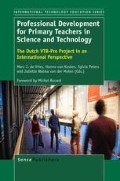Abstract
In the theoretical framework that was developed for the VTB-Pro project (Walma van der Molen, de Lange and Kok 2009), three main pillars are mentioned as the desired outcomes of professionalization activities. These are: knowledge and skills with respect to science and technology, attitudes towards science and technology, and pedagogical skills for inquiry-based learning and learning by design. Part I and Part II of this book dealt with the first two of these pillars; Part III is related to, but does not fully cover the third pillar.
Access this chapter
Tax calculation will be finalised at checkout
Purchases are for personal use only
Preview
Unable to display preview. Download preview PDF.
References
Baer, J. (1998). The Case for Domain Specificity of Creativity, Creativity Research Journal, 11(2), 173–177
Banks, F. (2009). Research on Teaching and Learning in Technology Education. In A. Jones & M.J. de Vries (Eds.) International Handbook of Research and Development in Technology Education (555– 568). Rotterdam/Taipei: Sense Publishers.
Brown, A.L. & Kane, M.J. (1988). Pre-School Children can Learn to Transfer: Learning to Learn and Learning from Example. Cognitive Psychology 20, 493–523.
Brown, J.S., Collins, A. & Duguid, P. (1989). Situated Cognition and the Culture of Learning. Educational Researcher 18(1), 32–42.
Carter, L. (2007). Sociocultural Influences on Science Education: Innovation for Contemporary Times. Science Education 92(1), 165–181.
Cross, N. (1984). Developments in Design Methodology. Chichester: Wiley.
Jonassen, D.H. (2006). On the Role of Concepts in Learning and Instructional Design. Educational Technology Research & Development 54(2), 177–196.
Lave, J., Smith, S & Butler, M.:(1988), Problem Solving as an Everyday Practice. In J. Lave, J. G. Greeno, A. Schoenfeld, S. Smith & M. Butler (Eds.), Learning Mathematical Problem Solving, Palo Alto, CA.: Institute for Research on Learning report no. IRL88–0006.
Lee, O. (2005). Science Education With English Language Learners: Synthesis and Research Agenda. Review of Educational Research 75(4), 491–530.
Nardi, B.A. (1996), Studying Context: A Comparison of Activity Theory, Situated Cognition Models, and Distributed Cognition. In: Nardi, B.A. (Ed.), Context and Consciousness: Activity Theory and Human-Computer Interaction (69–102). Cambridge, MA: MIT Press.
Newell, A. & Simong, H.A. (1972). Human Problem Solving. Englewood-Cliffs: Prentice-Hall.
Novak, J.D. (2005). Results and Implications of a 12-Year Longitudinal Study of Science Concept Learning. Research in Science Education 35, 23–40.
Pilot, A. & Bulte, A.M.W. (2006). The Use of “Contexts” as a Challenge for the Chemistry Curriculum: Its successes and the need for further development and understanding. International Journal of Science Education, 28(9), 1087–1112.
Porlan, R. & del Pozo, R.M. (2004). The Conceptions of In-service and Prospective Primary School Teachers About the Teaching and Learning Science. Journal of Science Teacher Education, 15(1), 39–62.
Vries, M.J. de (2005). Teaching About Technology. An Introduction to the Philosophy of Technology for Non-Philosophers. Dordrecht, Netherlands: Springer.
Walma van der Molen, J., Lange, J. de & Kok, J. (2009). Professionalisation in science & technology in The Netherlands: Primary education. Theoretical framework. The Hague, The Netherlands: Platform Bèta Techniek.
Author information
Authors and Affiliations
Editor information
Editors and Affiliations
Rights and permissions
Copyright information
© 2011 Sense Publishers
About this chapter
Cite this chapter
Vries, M.J.d. (2011). Introduction to Part III. In: Vries, M.J.d., Kuelen, H.v., Peters, S., Molen, J.W.v.d. (eds) Professional Development for Primary Teachers in Science and Technology. International Technology Education Studies, vol 9. SensePublishers. https://doi.org/10.1007/978-94-6091-713-4_12
Download citation
DOI: https://doi.org/10.1007/978-94-6091-713-4_12
Publisher Name: SensePublishers
Online ISBN: 978-94-6091-713-4
eBook Packages: Humanities, Social Sciences and LawEducation (R0)


